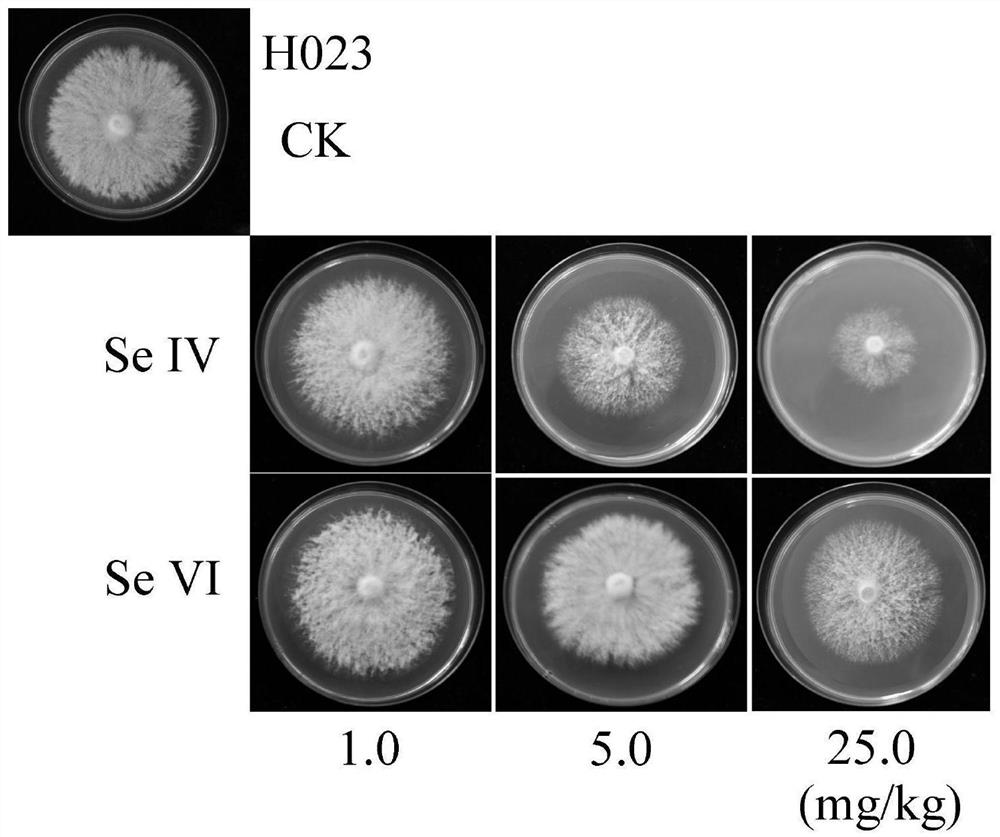Method for Biosynthesizing Organic Selenium Using Seafood Mushroom
A technology for seafood mushrooms and organic selenium, applied in the field of microbiology, can solve problems such as no MeSeCys, and achieve the effects of controllable amount of selenium added, short fruiting and growth time, and white and tender color
- Summary
- Abstract
- Description
- Claims
- Application Information
AI Technical Summary
Problems solved by technology
Method used
Image
Examples
Embodiment 1
[0032] Embodiment 1 strain breeding and the acquisition of selenium-enriched carrier
[0033] The seafood mushroom strain H023 preserved in the Edible Mushroom Research Office of China Agricultural University was cultured on PDA medium for 14 days, and 5 mm of bacteria cakes were taken from the growth edge of the colony to inoculate sodium selenate and sodium selenite at 1.0 mg / kg respectively. , on 5.0mg / kg and 20.0mg / kg plates, cultured at 21°C for 10 days, and measured the diameter of the colony. The results showed that the colony growth of H023 was significantly inhibited under the treatment of 5.0mg / kg sodium selenite; at 25.0mg / kg Sodium selenate treatment significantly inhibited the growth of H023 mycelia ( figure 2 ).
[0034] Cultivate the seafood mushroom strain H023 preserved in the Edible Mushroom Research Office of China Agricultural University on PDA medium for 14 days, take 5mm fungus cakes from the growth edge of the colony and inoculate them on 10 PDA plates...
Embodiment 2
[0036] Embodiment 2 sodium selenate treatment selenium-enriched cultivation
[0037] The weight ratio of Douglas fir sawdust, corn cobs, soybean hulls and wheat bran with uniform particle size is 40:30:15:15, the pH is adjusted to 8 with lime powder, the moisture content is 80%, and the selenate concentration gradient is set to 0.5, 1.0, 2.5, 5.0, 10.0, 20.0, 40.0mg / kg, each culture bag is loaded with 2.0kg of mixed material, 121 ℃ high temperature, autoclave for 2 hours. After cooling to room temperature, the bacteria were inoculated. Take a 5mm uniform bacterium cake from the test tube for preserving the strain and inoculate it into a 500mL Erlenmeyer shaker flask filled with 150mL liquid PDA medium, and culture it with shaking at 170-180r / min at 21-23°C for 4 days as the first-grade bacteria kind. Use a sterile pipette to draw 5mL of bacteria from the first-level strain shake flask covered with mycelium balls and transfer it to a 500mL shake flask containing 150mL of PDA ...
Embodiment 3
[0038] Embodiment 3 Sodium Selenite Treatment Selenium-enriched Cultivation
[0039] Use Douglas fir sawdust, corn cobs, soybean hulls, and wheat bran with a weight ratio of 40:30:15:15, use lime powder to adjust the pH to 8, the moisture content is 80%, and the selenite concentration gradient is set 0.5, 1.0, 2.5, 5.0, 10.0, 20.0, 40.0 mg / kg, each culture bag is filled with 2.0 kg of mixed material, and sterilized in a high temperature and high pressure autoclave at 121 °C for 2 hours. After cooling to room temperature, the bacteria were inoculated. Take a 5mm uniform bacterium cake from the test tube for preserving the strain and inoculate it into a 500mL Erlenmeyer shaker flask filled with 150mL liquid PDA medium, and culture it with shaking at 170-180r / min at 21-23°C for 4 days as the first-grade bacteria kind. Use a sterile pipette to draw 5mL of bacteria from the first-level strain shake flask covered with mycelium balls and transfer it to a 500mL shake flask containin...
PUM
 Login to View More
Login to View More Abstract
Description
Claims
Application Information
 Login to View More
Login to View More - R&D
- Intellectual Property
- Life Sciences
- Materials
- Tech Scout
- Unparalleled Data Quality
- Higher Quality Content
- 60% Fewer Hallucinations
Browse by: Latest US Patents, China's latest patents, Technical Efficacy Thesaurus, Application Domain, Technology Topic, Popular Technical Reports.
© 2025 PatSnap. All rights reserved.Legal|Privacy policy|Modern Slavery Act Transparency Statement|Sitemap|About US| Contact US: help@patsnap.com



